- Home
- Mack Reynolds
Equality: In the Year 2000 jw-2 Page 15
Equality: In the Year 2000 jw-2 Read online
Page 15
A girl whom Julian would have thought no more than ten years of age came alongside and clawed at his arm. In spite of her age, she was carrying a baby. She was grubby, barefoot, and wore a single dirty rag.
She whined, “No mama, no papa. Hungry, hungry, hungry. Money, money, money.”
Julian stared at her, even as they continued to walk.
“Ignore the bloody little bitch,” Sir Edward commanded.
“But she looks like she’s half starving,” Julian said.
“Jolly well be better if she did, you know. Professional. Whole caste of them here in India. Parents were beggars, grandparents, all the way back to the days of Alexander the Great or whoever, don’t you know? See that baby? She probably rented it this morning.”
The child was still tagging along with her burden. “No mama, no papa…” Julian was embarrassed, and looked out of the side of his eyes to see how the passersby were taking the scene.
“Rented it?” he said.
“Why, yes. And sometimes beggar parents take their children and maim them. Twist their legs or arms around, blind them, or whatever, to gain sympathy. Bloody heathens.”
Julian felt slightly nauseated at the idea. He had changed a twenty-dollar traveler’s check at the hotel, and now had a pocketful of rupees and naye paise. He had gotten nearly five rupees to the dollar, to the Englishman’s disgust, and had been informed that on the black market, which Sir Edward offered to direct him to, he could have gotten half again as much. Julian had told him that it wasn’t important.
But, at any rate, he was now in a position to give the ten-year-old a coin or so.
Sir Edward snickered. “You think she is starving? Look at that gold ring in her ear. She’s a professional beggar, specializing in we whites. Some of the other beggars specialize in pilgrims and hang around the temples. Supposedly, the pilgrims gain merit in the eyes of the gods by giving to them. And they usually give one naye paise, about one twentieth of one of your Yankee cents.”
The child beggar followed them at least three or four blocks. In spite of his embarrassment, Julian continued to ignore her. After she dropped away, back into the teeming mob of pedestrians, another beggar, an unbelievably old man, took up the pursuit, whining in some language Julian had never heard before.
The Englishman snorted cynically. “That’s the end of her beat, dear boy. If she continued to follow us, the others would give her a bit of a show at the end of the day. Do you know what would happen if you gave this bloody nigger something?”
Julian said, “Well, no, but he seems to be very old.”
“He’d pass the information along, don’t you know, to his, ah, colleagues. Within ten minutes, you’d have half a dozen of the blighters trailing you.”
Before them reared an enormous Indian building, as large as a cathedral. It must have cost millions, Julian decided, but somehow, for him, it lacked beauty in a country so rich in beggars.
“Mumbadevi Temple,” his guide said. “The town’s jolly well overrun with temples. Hindu temples, Moslem temples, Zoroastrian, Buddhist, Jain-ian… I dare say there are hundreds in all. The Zoroastrians have an interesting bit. They don’t believe in either burial or cremation. Up in the Hanging Gardens they have several of what they call Towers of Silence. When one of them dies, his body is put on the top of one of the towers and buzzards come and eat the corpse. After a week or so of exposure, the bones are taken down and thrown into the tower’s well. Bloody gruesome, eh? You can watch the buzzards at work from a nearby hill.”
Julian’s nausea was not diminishing. “I… I don’t think I’d like that.”
He looked at the ornate, towering temple.
A cadaverously thin, barefooted, ragged man who seemingly was about to enter the temple gate suddenly staggered, his eyes popping in horror. Blood gushed from his mouth, spewing out onto the sidewalk. He staggered again, fell forward onto his face.
Julian automatically started forward.
Sir Edward quickly took his arm. “He’s beyond help, dear boy. Probably dead by now. The meat wagon will undoubtedly be along shortly. Besides, how would you like to catch whatever he had?”
The other pedestrians walked around the fallen man, ignoring him.
“Meat wagon?” Julian repeated, unable to keep his eyes from the body. He had never seen a person die before. It was all he could do to keep from vomiting.
Sir Edward hurried him on. “Every night, several hundred of the street people die. City trucks come around and pick up the bodies, don’t you know?” He added musingly, “Fewer seem to die during the day hours, but you see the corpses around from time to time.”
“Street people?”
“I dare say there are some half a million niggers here in Bombay that have no homes. They live on the streets, sleep on the streets at night. There are more than six-hundred thousand in Calcutta.”
The boy was appalled. “Can’t the government do something about them?”
“Dear boy, between a third and a half of the population of India goes to bed hungry every night. Probably some fifty million are starving to death, at a greater or slower pace. What would you expect the government to do? It’s deeply in debt as it is. My own concern is selling them tanks and armored cars, and most of it has to go on the cuff, as you Yankees call it.”
The Britisher indicated a smaller street. “We can cut through here to the Crawford Market. Largest in town, I wouldn’t wonder. What do the tourist ads always say? Picturesque and all that rot.”
They were in little more than an alley with tiny shacks on each side. Colored saris hung from some of the windows to dry and a few of the dwellings had plants suspended from the walls in old tin cans.
Halfway down the alley, Julian came to a halt. In a broken wheelbarrow were two tiny children, breathing heavily, their eyes very round. Both were naked, with arms and legs so thin as to be not much thicker than a piece of chalk; both had bellies swollen up to the size of watermelons.
He looked wildly at his companion, “Have they been abandoned by their parents?”
The other took him by the arm to lead him on. “Possibly. Come, there’s nothing you can do.”
Julian pulled away. “We can take them… take them to a hospital. See they’re fed. Have a doctor—”
Sir Edward said impatiently, “I told you there were some fifty million starving in India at any one time. You could drop the whole West fortune into this bottomless pit, and it wouldn’t have any noticeable effect whatsoever.”
He took Julian by the arm again and led him to the end of the alleyway and the wider street beyond.
Julian wrenched his arm away once more. “I… I don’t want to see any more. I want to go back to the ship.”
The other was miffed. He looked at his watch. “Very well. I had planned to take you to lunch. Charming restaurant called The Other Room, at the Ambassador Hotel, don’t you know? European cuisine, none of this bloody nigger stuff.”
The boy looked at him. “How many of these Indians could eat on what it would cost us there for a single meal?”
The other laughed his short, humorless laugh. “Hundreds of them, I shouldn’t wonder. Dear boy, the average Indian doesn’t spend in a year what it would cost us to lunch at The Other Room.”
Julian shook his head. “I’m going back to the ship.”
“Very well. No point in mucking around. Just head down this street. You’ll come out on the Frere Road. Turn right for about a mile and you’ll come to the Old Customs House and the government dockyard. You’ll be able to rent a boat there to return you to the cruise ship, I wouldn’t wonder.” Sir Edward was obviously mildly irritated.
Julian extended his hand. “Thank you very much, sir.”
“Oh, I say, not at all, dear boy. Give my regards to your uncle when the trip is over.”
Although the directions had seemed very simple, Julian managed to lose his way. After a time, he found himself in a slum street, not much different than the alleyway in which he had se
en the starving children.
From a dark doorway a voice hissed at him, “Sahib?”
He came to a halt, frowning. He could make out an Indian woman in a pink sari, a caste mark on her forehead. She had by the hand a child of possibly four or five, with its own small sari. It was a beautiful child.
Julian came closer and said, “Yes?”
The woman beckoned to him, but he still didn’t understand. “What do you want?” he asked.
She reached down and lifted the child’s sari.
Julian blanched. At this point in his life, he had never had sexual relations, but there was no misunderstanding the gesture. He was being offered the child’s body. The woman was attempting to sell the little girl sexually. Her own daughter? Probably, he thought numbly.
It was at this point that he awoke, the horror still with him.
As he lay there, the rest of the experience came back. He had returned to the ship, after getting directions from another Sikh police officer, and had remained on it for the balance of the stay in India. He had not gone ashore again until they reached Hong Kong, and then only to take an airplane back to the States.
Spending the whole West fortune would not have been a drop in the bottomless pit of India’s poverty, according to Sir Edward Fitz-James. But when he had finally come into his inheritance, couldn’t he have done something, maybe set up a foundation to at least help out? Perhaps some hospitals, or orphanages?
But no, he told himself now, he hadn’t done a thing. Like his fellows, he had looked at philanthropy largely as a tax dodge. Born to wealth, he had been contemptuous of those who didn’t have it; it was a God-given privilege that he enjoyed because of his innate right to enjoy it. The only foundations West Enterprises had ever endowed had in one manner or another profited him, including the one set up for Dr. Pillsbury in return for putting him into stasis.
But the poverty of India had distressed him as a boy. Looking backward now, he couldn’t dismiss the poverty pockets in his own supposedly wealthy country. He had seen slums in Washington, D.C. not half a mile from the White House that were nearly as bad as those of Bombay. He had seen slums in New York, Chicago, and Los Angeles, possibly the three richest cities of the time, that were unbelievable.
Chapter Fourteen
The Year 2, New Calendar
In the past, man had little power over either his environment or his own nature. Nothing we did could fundamentally affect these factors, which were the result of natural processes that have acted over billions of years. But advances in our scientific knowledge, and the technological capabilities flowing from this knowledge, are making it possible for the human race to influence itself and its environment in major ways… If the decisions are not made rationally, it is highly unlikely that we or our descendants will appreciate the world that emerges.
—Gerald Feinberg, The Prometheus Project
Julian had planned to spend a few hours at his studies before going over to the Leetes’, but it didn’t work out that way.
He had hardly finished his toilet and breakfast and sat down at his desk, when the phone screen buzzed.
He activated it and was confronted with the youthful, open face of Sean O’Callahan.
“Good morning, Mr. West. I hope I’m not bothering you.”
“Make it Julian. No, of course not. What can I do for you, Sean?”
He grinned. “Well, as a matter of fact, I have somewhat of a surprise for you. Can you come over to my place? I’m in Building Two, sixteenth floor, apartment sixteen-B.”
“A surprise?” Julian echoed—surprised.
“That’s right.”
He said, “All right, I’ll be right over.”
“Fine.” The other’s face faded from the screen.
Julian stood up and made his way toward the door. He couldn’t think of any particular reason to notify the Leetes of his little expedition into the outside world. In fact, unless he was mistaken, this was one of Edith’s work days and hadn’t Mrs. Leete said something about attending a meeting?
He took the elevator down to the metro level, and looked around. Always before when he had ventured out, one or more of the Leetes had been along, so he hadn’t had to figure out the transport system.
He asked the first passerby in halting Interlingua how to get to Building Two, which he assumed to be one of the other high-rise apartment buildings in the university city. The directions were simplicity itself, and he took the next car heading for his destination.
He’d hardly had time to seat himself before they were at a new station whose sign read BUILDING TWO. He got out and made his way over to the elevator banks. From time to time people passing would smile at him in friendly fashion, and twice people nodded and said, “Mr. West,” by way of greeting. Although he knew none of them, evidently his face was recognized widely. So, he was rapidly becoming a minor celebrity in spite of Dr. Leete’s attempts to shield him in these early weeks of his arrival from the past.
He said, “Sixteenth Floor,” into the elevator’s screen and the robotlike voice answered, “Yes, Mr. West.” He wondered vaguely what would happen if he went out to some place on the Pacific coast: would the elevator screens recognize him there? Were the data banks and the face of every resident of United America tied in with every screen in the country? The magnitude of it all rather boggled his mind.
There were signs on the wall on the sixteenth floor, giving directions. He had no difficultly finding Sean O’Callahan’s apartment. He pressed the button, standing before the identity screen.
The door opened, and he was greeted by a beaming Sean.
“Come in and meet your surprise.”
Frowning in puzzlement, Julian followed his host into the living room. Four men were seated there, including William Harrison and Frederic Ley. The other two were strangers: a young man of possibly thirty, tall, intelligent-looking, with a somewhat quizzical expression; the other must have been somewhere in his early seventies, slightly heavy, gray hair and mustache, slightly florid face.
The latter said in a slow voice, “Hello, Jule. It’s been a long time.”
Julian stared at him, shot a puzzled look at the grinning Sean, then gazed back at the elderly man.
“You look exactly like you did the last time we saw each other in the Knickerbocker-Links Club in New York. I’m afraid you can’t say the same about me.”
“I’ll be damned!” Julian exclaimed. “Bert Melville!”
“That’s right, Jule. I thought you were committing suicide when you let that crackpot Doctor Pillsbury put you into hibernation; evidently he wasn’t as big a crackpot as everybody thought. Here you are, looking about thirty-five. Here I am looking seventy-three and feeling every year of it. I should have let him put me under too.”
“To wake up in a world like this?” Harrison said bitterly.
Sean led Julian over to the younger man, who stood at their approach. “This is Dave Woolman,” he said, “who has one of the most fascinating jobs in the country.”
Dave had a very sincere, unhumorous smile, and shook hands strongly. “I’ve been looking forward to meeting you. Somebody out of the past. Somebody who knew the real world.”
Julian didn’t quite get that. He said, “Nice to meet you. What’s the most fascinating job in the country?”
“Sit down. Sit down, everybody,” said Sean. When they were seated, he explained, “Possibly not for Dave. It’s probably just tedious routine for him, but he’s in charge of the Radio Astronomy Observatory on Luna.”
Julian shook his head. “What’s radio astronomy? Astronomy is a field on which I was completely blank even in the 1960s. You can imagine to what extent I’m ignorant now, after a third of a century of progress. Did you say Luna? You mean there’s an observatory on the moon?”
Dave Woolman nodded. “It was decided as far back as 1960 that the radio telescope, rather than the spaceship, would probably be the first instrument to establish contact with intelligent life beyond the solar system.
Since your time, we have receivers of such sensitivity and antennas of such enormous size, that we are optimistic about sending and picking up radio signals from the nearer stars. The search for these signals began in 1960 at the National Radio Astronomy Observatory in Greenbank, West Virginia. The Luna Observatory is a great advantage. It’s located on the far side, and hence cut off from a great deal of the local radio interference that an earth-bound observatory suffers.”
“I’m impressed,” Julian said. “Have you been able to pick up any messages from other worlds?”
A strange silence fell over the whole group.
Woolman said finally, “I am afraid I’m not in a position to answer that.”
The elderly Bert Melville changed the subject. He had been looking at Julian intently, and now he turned to Harrison and said, “You know, Jule and I used to belong to a consorium based in New York, the Bahamas, and Switzerland. We used to swing some pretty big deals.” His laugh quavered a bit. “Those were the days, eh, Jule? Remember the time we squeezed out Bob Percy and took over Diversified?”
“Yes. Yes, I remember that operation. Bob shot himself afterwards.”
“I’d forgotten about that part of it,” Melville said.
Harrison seemed slightly impatient. He said to Julian, “Did you think over what we were discussing the other day—in short, Utopias?”
“Yes, yes I did. Frankly, I didn’t come up with much in the way of a conclusion.”
Harrison nodded. “I was just giving you some preliminaries to work on, Mr. West. Are you acquainted with the work of a contemporary of yours, the British writer Arthur C. Clarke?”
Julian frowned a little. “It seems to me that the Leetes have mentioned him a couple of times, as a popularizer of science.”
“Yes.” Harrison got to his feet and went over to the library booster, which sat on the desk. He dialed as he said over his shoulder, “This is from one of his books. Astonishingly prophetic. I’ll read you just this one passage.

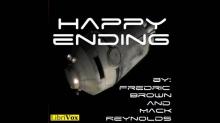 Happy Ending
Happy Ending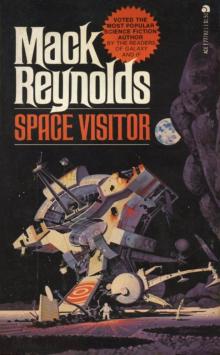 Space Visitor
Space Visitor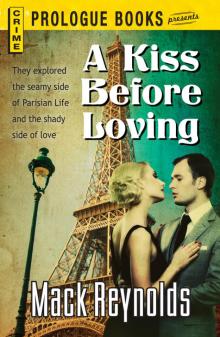 A Kiss Before Loving
A Kiss Before Loving Episode on the Riviera
Episode on the Riviera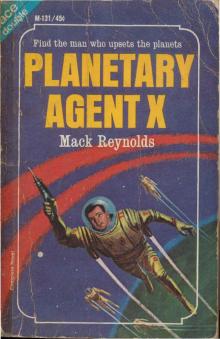 Planetary Agent X
Planetary Agent X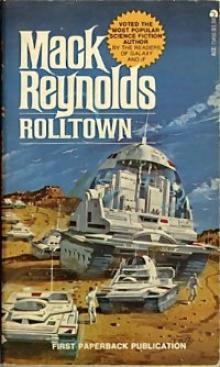 Rolltown bh-3
Rolltown bh-3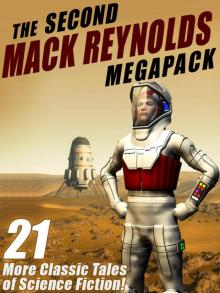 The Second Mack Reynolds Megapack
The Second Mack Reynolds Megapack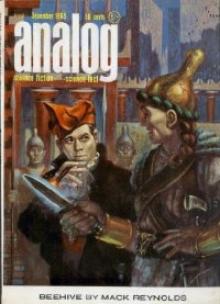 Dawnman Planet up-2
Dawnman Planet up-2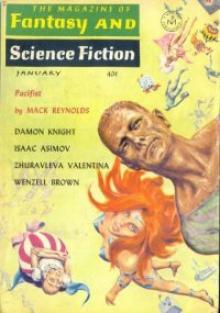 Pacifist
Pacifist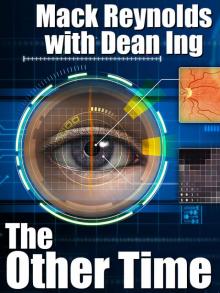 The Other Time
The Other Time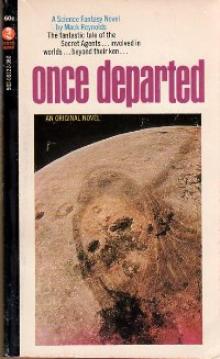 Once Departed
Once Departed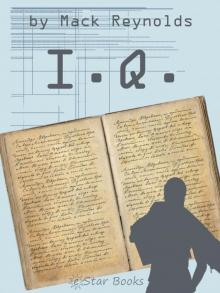 IQ
IQ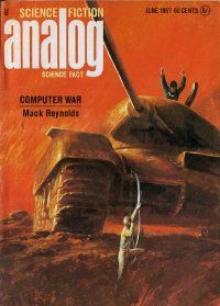 Computer War
Computer War Earth Unaware
Earth Unaware The Rival Rigelians up-3
The Rival Rigelians up-3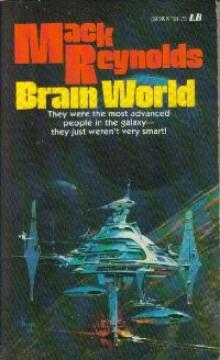 Brain World up-7
Brain World up-7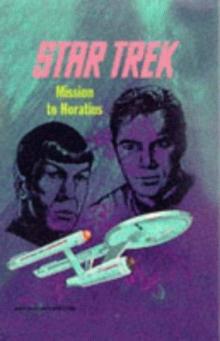 Star Trek - TOS - Mission to Horatius
Star Trek - TOS - Mission to Horatius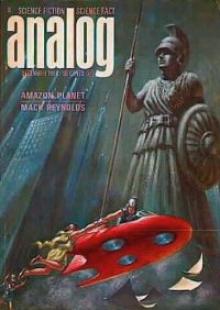 Amazon Planet up-5
Amazon Planet up-5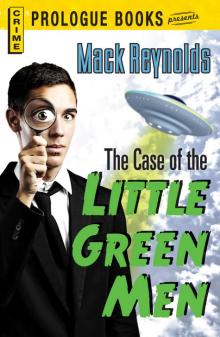 The Case of the Little Green Men
The Case of the Little Green Men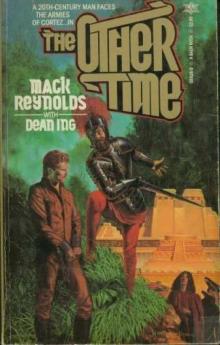 Other Time
Other Time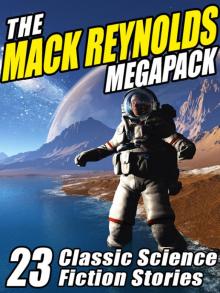 The Mack Reynolds Megapack
The Mack Reynolds Megapack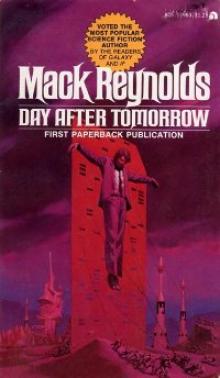 Day After Tomorrow
Day After Tomorrow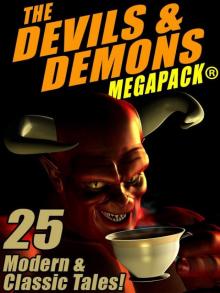 The Devils & Demons MEGAPACK ®: 25 Modern and Classic Tales
The Devils & Demons MEGAPACK ®: 25 Modern and Classic Tales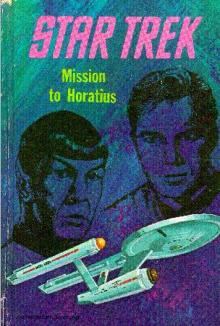 Mission to Horatius
Mission to Horatius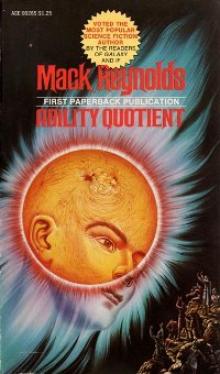 Ability Quotient
Ability Quotient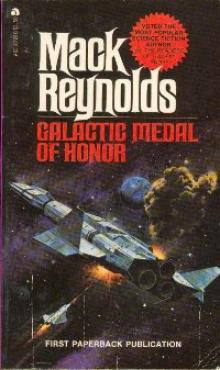 Galactic Medal of Honor
Galactic Medal of Honor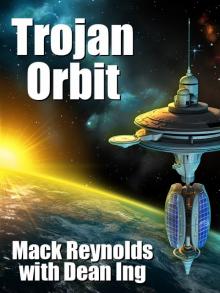 Trojan Orbit
Trojan Orbit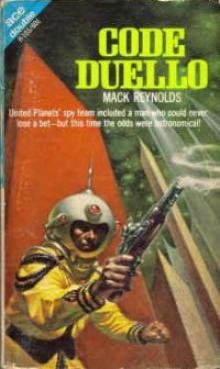 Code Duello up-4
Code Duello up-4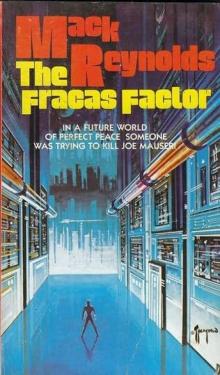 The Fracas Factor
The Fracas Factor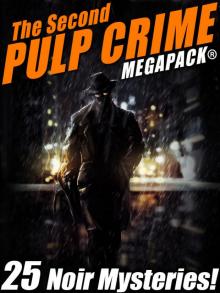 The Second Pulp Crime
The Second Pulp Crime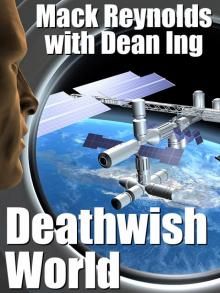 Deathwish World
Deathwish World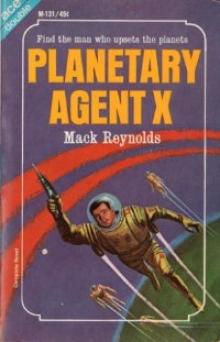 Planetary Agent X up-1
Planetary Agent X up-1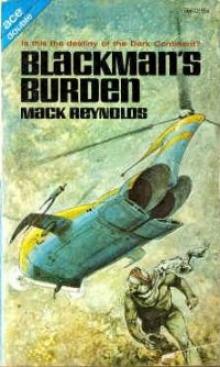 Blackman' Burden na-1
Blackman' Burden na-1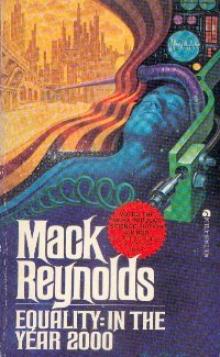 Equality: In the Year 2000 jw-2
Equality: In the Year 2000 jw-2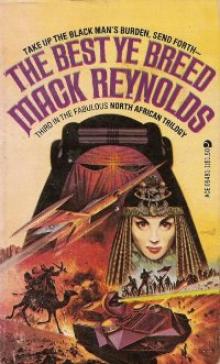 The Best Ye Breed na-3
The Best Ye Breed na-3 The Jet Set
The Jet Set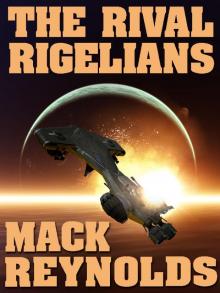 The Rival Rigelians
The Rival Rigelians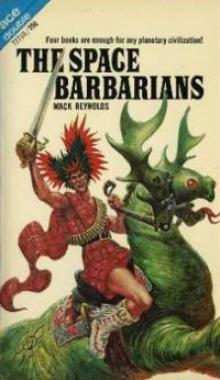 The Space Barbarians
The Space Barbarians